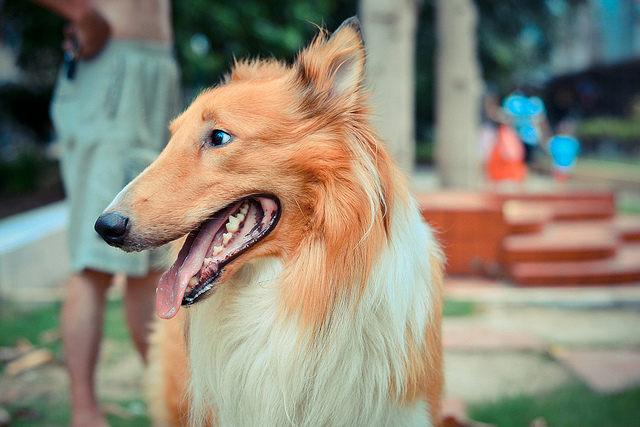Help! A Dog Is Knocking Down My Fence!
Whether you have an exuberant dog inside your fence who's always trying to fly the coop, or unwanted visitors outside the fence knocking it down, canines constantly testing the integrity of your fence can be a real pain. How do you keep dogs from knocking down fences, and if it's a recurrent problem, how do you repair your fence to make it harder for animals to get through?
Unfortunately for fencing, often dogs are extremely smart when it comes to finding their way from one place to another. Whether made from wire, wood, plastic, or other materials, many fences pose no more than a momentarily interesting puzzle to determined dogs, which can be a real problem. If you're trying to keep your own dogs secure, you don't want them running around the neighborhood causing problems or exposing themselves to the risk of injury. Conversely, you may be concerned about safeguarding livestock, family members, and your grounds from neighborhood dogs.
Keep dogs away from your fence
It can be difficult to keep a dog away from a fence. One option is to install an electric fence in conjunction with a regular fence to deliver a mild shock to any curious noses testing the fence line. Make sure to post the fence clearly so people are aware it's electrified. If the problem is outside dogs, you can locate their owners and stress that their dogs need to be better secured (many regions require dogs to be leashed or securely fenced). Beyond that, the solution to the problem lies primarily in reinforcing your fence so it will remain steady even when dogs are pushing at it.
Protect fencing against large breeds
This can be a particularly problem with large breeds, as they can knock over even sturdy fence posts with relative ease. To keep these dogs from knocking down fencing, you'll need to reinforce your fence posts (make sure they're at least three feet deep, with concrete footers), ensure all your fence braces and hardware are in good condition, and check the fencing itself. For wire fencing, this includes examination for holes and weak points, especially areas where the fence is bowing or buckling and dogs could push through.
If you have a slatted fence, you'll need to test each slat by hand for rot and other damage, as well as damage to the fasteners holding it in place. Some slats may need to be replaced altogether, while others could be temporarily removed to allow you to replace the fasteners. A baseboard at the bottom of the fence can help add security to a slatted fence, ensuring that slats won't give under pressure.
Keep up with fence maintenance
In both cases, the goal is to keep dogs from knocking down the fence by making sure the fence is solid and uniform, without any weak points. Hire a pro, if necessary, for replacement of rotted posts or other fence repair. If dogs encounter consistent resistance all along the length of a fence, they quickly learn that pushing at it, leaning on it, and jumping on it won't have much of an effect, because the fence is too strong for them to push over. Unfortunately for you, you need to keep up with fence maintenance to ensure that no weak points develop, as dogs can be stubborn when it comes to periodically rechecking for fence vulnerabilities.
Make fencing higher or opaque
You may also find it helpful to extend the height of the fencing (first check the maximum permitted by law) or make it opaque. Dogs tend to be more inclined to knock down fences when they can see things like other dogs, deer, and rabbits on the other side. If they don't have visual targets to chase, they may be less likely to hurl themselves at the fencing and damage it. One easy option is to wrap the fence in outdoor fabrics designed for this purpose, but you can also add slats or replace shorter slats with tall ones. Taller fencing will conveniently keep deer out, as well.
Thy neighbor's dog
If your neighbors' dog keeps knocking over the fence, depending on regional law, the neighbors may be responsible for putting it back up. You'll need to establish which property the fence is on, and demonstrate that the dog is responsible, in order to press your case. You may find it helpful to extend an olive branch by offering to help. While the neighbors could be legally liable, approaching a fence-related argument aggressively can sometimes go poorly.
In cases where neighbors are not cooperative and their dogs are aggressive, you can file a complaint with Animal Control. While the agency won't mediate in the fencing dispute, it can inspect the house for signs of abuse, issue a citation to remind your neighbors to train their dogs properly, and warn them about the potential consequences of future complaints.
Katie Marks writes for Networx.com.
Updated March 7, 2018.
Looking for a Pro? Call us (866) 441-6648

Fencing Average Costs
Fence Contractors Experiences

Local Handyman Fixes Fence Damaged By Jacksonville Summer Storm

Rotted Fence Repair Taken Care Of Fast And Efficiently




